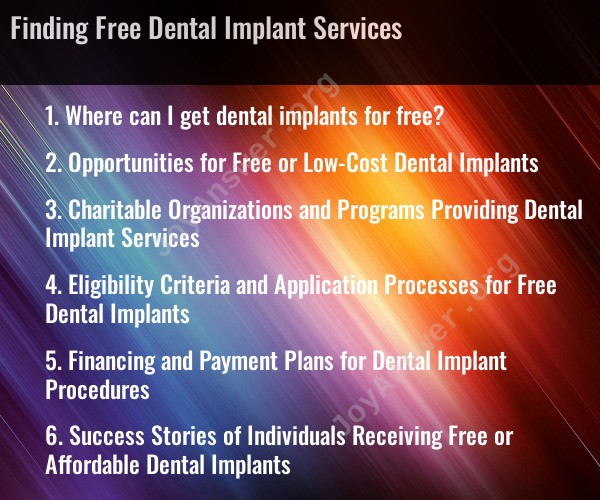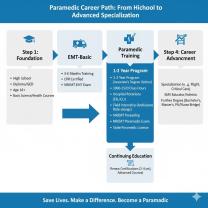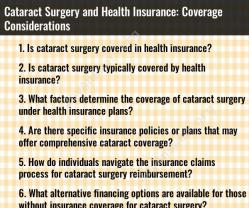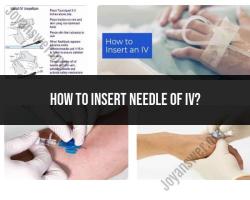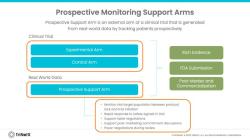Where can I get dental implants for free?
Getting dental implants for free is quite rare, as dental implant procedures are typically expensive and often not covered by standard health insurance plans. However, there are some limited options and programs that may provide free or low-cost dental implants to individuals in specific circumstances. Here are some potential avenues to explore:
Dental Schools: Dental schools often offer dental services, including dental implant procedures, at reduced rates. While they may not be entirely free, the costs are generally lower than what you would pay at a private practice. Dental students, under the supervision of experienced faculty, perform the treatments. Be prepared for longer treatment times due to the educational nature of the setting.
Clinical Trials and Research Studies: Some universities and dental research institutions conduct clinical trials or research studies related to dental implants. In some cases, participants may receive free or heavily discounted dental implant procedures. Keep an eye out for local research opportunities and consider enrolling if you meet the criteria.
Nonprofit Organizations and Charities: Certain nonprofit organizations and charities may offer free dental implant services to individuals in need. These programs are usually limited and may target specific populations, such as veterans, low-income individuals, or those with severe dental health issues. Search for dental charities or free dental clinics in your area.
Donated Services: Some dentists and oral surgeons participate in programs like "Donated Dental Services" (DDS), which provide free or deeply discounted dental care to individuals with disabilities, serious medical conditions, or other qualifying factors. These programs are typically administered by local dental associations.
Medicaid and State Assistance Programs: While Medicaid may not cover dental implants in all states, it's worth checking if your state's Medicaid program provides coverage for certain dental procedures. Eligibility and coverage vary by state, and dental implant coverage may be limited to specific cases.
Dental Tourism: In some countries, dental implant procedures are more affordable than in others. Some people opt for dental tourism, where they travel to another country for dental treatment at a lower cost. However, be cautious when considering this option and thoroughly research the credentials of the dental professionals and the safety of the facility.
Crowdfunding and Fundraising: You can create crowdfunding campaigns on platforms like GoFundMe to raise funds for your dental implant procedure. Share your story and fundraising campaign with family, friends, and social networks to seek financial support.
Sliding Fee Scale Clinics: Some dental clinics offer a sliding fee scale based on your income and ability to pay. While this won't make dental implants free, it can significantly reduce the cost.
It's important to note that the availability of free or low-cost dental implant services varies by location and individual circumstances. Dental implants are a significant investment in oral health and appearance, and while there are options to reduce costs, it's essential to research and choose reputable providers to ensure the quality and safety of the procedure. Always consult with dental professionals to discuss your specific needs and financial options.
Opportunities for Free or Low-Cost Dental Implants
There are a number of opportunities for free or low-cost dental implants. Some of the most common options include:
- Charitable organizations and programs: There are a number of charitable organizations and programs that provide dental implant services to those who cannot afford them. Some of the most well-known organizations include the Dental Lifeline Network, the National Association of Free and Charitable Clinics, and the Donated Dental Services program.
- Dental schools: Many dental schools offer free or low-cost dental implant services to their students. This is a great way for students to gain experience and for patients to receive affordable dental care.
- Government programs: Some government programs, such as Medicaid, may cover the cost of dental implants for certain individuals.
- Clinical trials: There are a number of clinical trials underway that are testing new dental implant technologies and procedures. Some of these trials may offer free or low-cost dental implants to participants.
Charitable Organizations and Programs Providing Dental Implant Services
Here are some specific examples of charitable organizations and programs that provide dental implant services:
- Dental Lifeline Network: The Dental Lifeline Network is a national nonprofit organization that provides free dental care to low-income individuals with disabilities and seniors. To be eligible for services, you must meet certain income and disability requirements.
- National Association of Free and Charitable Clinics: The National Association of Free and Charitable Clinics is a network of over 1,200 clinics that provide free or low-cost dental care to low-income individuals and families. To find a clinic in your area, you can visit the NAFCC website.
- Donated Dental Services: Donated Dental Services is a program of the American Dental Association that provides free dental care to veterans and people with disabilities. To be eligible for services, you must meet certain income and disability requirements.
Eligibility Criteria and Application Processes for Free Dental Implants
The eligibility criteria and application processes for free dental implants vary depending on the organization or program that you are applying to. However, most organizations require that you meet certain income and residency requirements. You may also need to provide proof of your disability or veteran status.
To apply for free dental implants, you will typically need to complete an application form and provide supporting documentation, such as proof of income and residency. You may also need to attend an interview to assess your needs and eligibility.
Financing and Payment Plans for Dental Implant Procedures
Even if you do not qualify for free dental implants, there are a number of financing and payment plans available to help you afford the procedure. Many dental practices offer in-house financing options, and there are also a number of third-party lenders that specialize in dental financing.
When choosing a financing option, it is important to compare interest rates and terms. You should also make sure that you can afford the monthly payments.
Success Stories of Individuals Receiving Free or Affordable Dental Implants
There are many success stories of individuals who have received free or affordable dental implants. For example, the Dental Lifeline Network has helped over 100,000 people receive free dental care since its inception.
Here is one example of a success story:
- Sarah: Sarah was a 55-year-old woman who had lost all of her teeth due to gum disease. She was struggling to eat and speak, and she felt embarrassed about her smile. Sarah applied to the Dental Lifeline Network and was approved for free dental implants. She now has a beautiful new smile and is able to eat and speak normally again.
If you are struggling to afford dental implants, there are a number of resources available to help you. Be sure to research your options and contact a qualified dentist or dental professional to discuss your needs.
